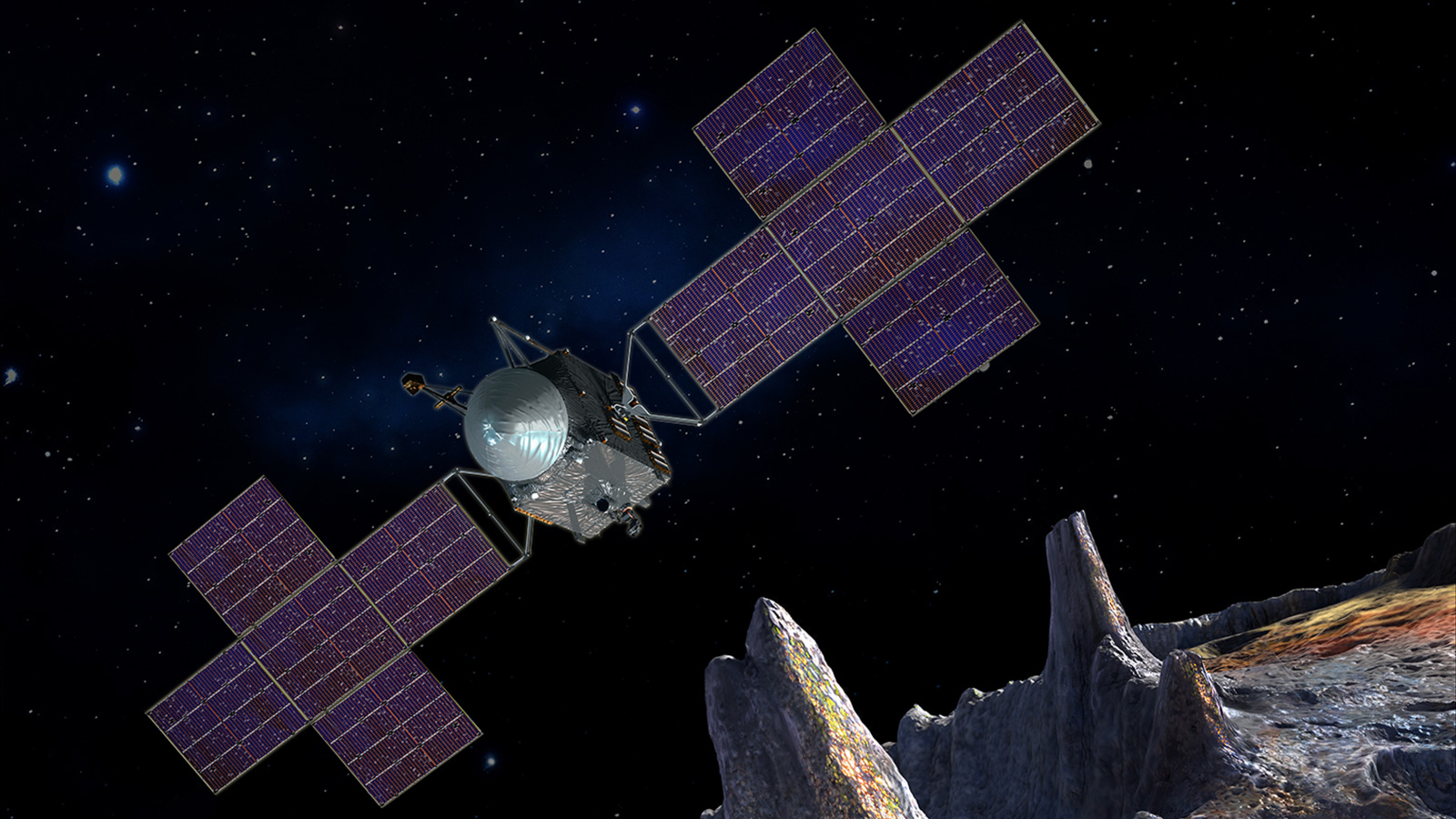
NASA says the Psyche mission, a robotic asteroid explorer that missed a launch opportunity this year due to software testing problems, has been rescheduled for liftoff from Florida in October 2023 on a SpaceX Falcon Heavy rocket.
The space agency announced Friday the outcome of a so-called “continuation/termination review” chartered to decide whether to proceed with the Psyche mission after problems with testing the spacecraft’s software caused it to miss launch periods in August, September, and October of this year.
NASA officials decided to continue with the Psyche mission after reviewing the work of an independent review board established to look into the causes of the software testing issues, which involved a software testbed at the Jet Propulsion Laboratory in California, the NASA center in charge of the Psyche project. The spacecraft itself was delivered to NASA’s Kennedy Space Center in April for final launch preparations, and it remains in a clean room processing facility at the Florida spaceport.
But the software for the Psyche spacecraft’s guidance, navigation, and control system was completed several months late, and engineers ran into problems configuring testbed simulators at JPL to verify all the software functions are ready for launch.
“I’m extremely proud of the Psyche team,” said Laurie Leshin, director of JPL. “During this review, they have demonstrated significant progress already made toward the future launch date. I am confident in the plan moving forward and excited by the unique and important science this mission will return.”
The new launch period for the Psyche mission opens Oct. 10, 2023, according to NASA. SpaceX is under contract to launch the Psyche mission on a Falcon Heavy rocket.
The Psyche spacecraft will swing by Mars in 2026 for a gravity assist that will send it toward its its destination, the asteroid Psyche. The spacecraft will enter orbit around the asteroid in August 2029 after a nearly six-year cruise through the solar system. Due to constraints of orbital dynamics, the one-year launch delay will trigger a three-year delay in the spacecraft reaching the asteroid it will study.
If the mission had launched this year, the spacecraft would have arrived at asteroid Psyche in 2026.
NASA said the independent review board set up to investigate the software testbed woes is finishing its report. The agency said it will share the report publicly, along with NASA’s official response.
When they announced in June that Psyche would miss its launch opportunity this year, NASA officials said the software testing problem involved the unique blend of mission components from JPL and Maxar, which supplied the Psyche spacecraft’s solar electric propulsion chassis.
The software simulator is located on the JPL campus in Southern California, and is designed to replicate functions of the Psyche spacecraft. Engineers needed to merge components from JPL and Maxar to fully test the software for the Psyche mission.
In Friday’s update on the Psyche mission, NASA did not quantify the financial impacts of the launch delay or detail any of the corrective actions to restore the JPL testbed and complete software testing. The Psyche mission is part of NASA’s Discovery program of cost-capped planetary science missions, and the continuation/termination review is part of the agency’s standard response when a such a mission runs into a delay or a significant cost increase.
Before the launch delay to 2023, the Psyche mission was estimated to cost $985 million, including expenses for the launch on a SpaceX Falcon Heavy rocket and operating costs for the cruise to Psyche. NASA said in June it had spent $717 million on the Psyche mission to date.
“I appreciate the hard work of the independent review board and the JPL-led team toward mission success,” said Thomas Zurbuchen, associate administrator of NASA’s science mission directorate, in a statement. “The lessons learned from Psyche will be implemented across our entire mission portfolio. I am excited about the science insights Psyche will provide during its lifetime and its promise to contribute to our understanding of our own planet’s core.”
Psyche, the asteroid, has an irregular shape, an average diameter of about 140 miles (226 kilometers), and is made mostly of nickel and iron metals. The NASA mission will be the first spacecraft to explore a metal-rich asteroid, which may be the leftover core of a protoplanet that began forming in the early solar system more than 4 billion years ago.
Two small spacecraft were originally supposed to share the Falcon Heavy launch with Psyche. NASA’s twin Janus probes, each weighing just 80 pounds (36 kilograms), are designed to head off into the solar system to fly by different asteroids.
With the Psyche launch delay from August of this year, the Janus small satellites were no longer able to reach their original asteroid targets. NASA said Friday it is continuing to assess options for the Janus mission.
Email the author.
Follow Stephen Clark on Twitter: @StephenClark1.
